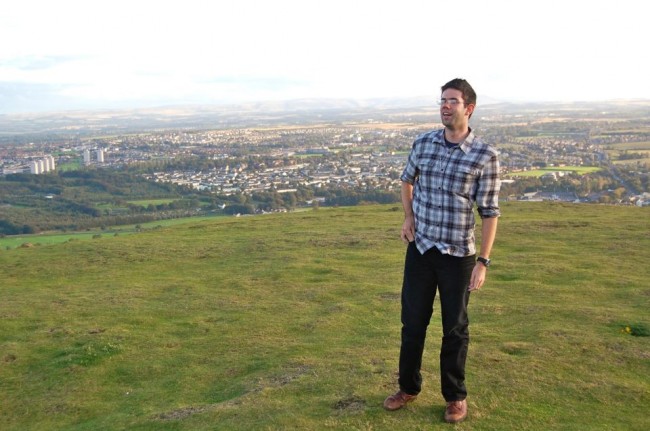
By: Daniel Morgan (Class of 2013)
As an American studying abroad, the two most frequent questions I received over my regrettably brief stint in Edinburgh were, firstly, why I had decided to travel some thirty two hundred miles just to study history; and secondly, why someone born and raised in the States would be so interested in medieval history. Before I could even begin to answer these questions, though, I thought that I should first answer why so many people would think to ask me these same two.
It must have seemed baffling from the point of view of a UK citizen studying the humanities, and perhaps many European humanities students in general, to travel so far just to read the same books or listen to similar lecturers/professors expound upon the same subjects. After all, one of the most wonderful features of the humanities in general, and for me history in particular, is that it is concerned with a unified thought world, in which all philosophical partisanship is leveled out in the pursuit of “the truth,” or “meaning.” So, despite a few stylistic differences here and there, how is being taught history in a foreign country any different than studying history in one’s own country?
In this vein, the second question seems almost legitimate – what interest could an American possibly have in a history that is so far outside the realm of his own cultural and or personal experience? I suppose it must have seemed abundantly strange that the United States, lacking its own medieval past, could produce anyone interested in the medieval period at all. Yet a more important part of this question to some was in tacitly asking how an American could even hope to comprehend the true depth of a history not his own.
After reflecting on these questions, I quickly came to the realization that despite the fact that these two questions were often posed to me quickly following one another by the same individual. That is, from person to person, these same two questions kept coming up. This seems odd to me, considering that the underlying presumptions behind the two questions are at odds with each other; the former presupposes that the historiography in essence, if not in application, is universalizing, while the latter begins with the assumption that certain thoughts and ideas are inaccessible to the historian from outside his target culture or civilization. That both of these assumptions at may be dismissed as overly simplistic is beyond question, but what fascinates me is that with so many people I spoke to at length on this subject, they seem to be entirely comfortable holding both views.
Yet, in responding to these questions, I found myself articulating a reason for studying medieval history abroad that holds two potentially conflicting ideas in tandem. Although students of history do not operate in any wholly unified thought world, as each historian must admit that her or she is a scholar who can never completely become unencumbered with their identities (national, racial, economic, sexual, etc.), there is something to be said for universality of the practice of history – the omnipresent human desire to relate to and understand the past. This human trait is what makes possible the study of history outside one’s accustomed manner or style. The fact remains that while the realm of history is not a borderless country, its limits are porous, and we can return from foreign lands (both literally and figuratively) with incredible treasures. Rather than faced with the extremes of either endless redundancy (if history is a wholly unified thought-world) or an insurmountable tower of babel (if foreigners can never wholly comprehend history outside their own culture’s experience), the historian is instead presented with a landscape that is open to exploration from many possible starting points and leading to many different destinations.
Yet to answer the original two questions more directly, and why I chose Edinburgh and all it contains as my destination, I can only answer that there is something to be said for reading history in “its own place.” In many ways, the practice of history is the effort of making something tangible out of something intangible – it is an act of com-prehension, a “bringing together,” the same way that one draws the fingers of the hand together. However, as with most intellectual endeavors, the mind requires an Image to stand in the place of pure-thought, and thus makes use of Symbols to understand and actualize its object. With this in mind, being in a different place, appropriating and comprehending (bringing together) more experiences allows to historian access to more Symbols, the necessary tools of the trade, and the required materials for the completion of his or her object. By reading history in “its own place,” where it actually occurred, the historian can be more assured of the relevance of these Symbols.
To use my experience as an example, the works of Fraser, Woolf, Oram, Brown, Barrow, and Grant only taught me so much about Scotland’s medieval experience; wandering the halls of Dumferline, climbing the steep battlements at Stirling, and gripping the railing of a ferry as I watched the Western Isles role by were necessary complements to my reading. While I wouldn’t have understood the significance of the Hereford Mappa Mundi without having extensively studied it for a semester before my trip to Britain, I certainly wouldn’t never really felt its significance until I stood before it in Hereford Cathedral just five months ago. Finally, Edinburgh Castle and the streets of old town, more passive but perhaps of greater importance, shaped my experience as a historian – no matter where I went and no matter what I read, that distinctly medieval edifice loomed over me, down among the twisting closes and wynds, and cast its shadow over my every thought. This is how I was able to study the Middle Ages – it was inescapable.
I’ve spent a lot of time now thinking about what it means to study history, and trying to define exactly what it is we do when we study the past. For all my studies, the hardest I’ve had to think about these questions yet was not in the lecture hall – it was in the White Hart Pub, among my friends and perhaps future colleagues, in one of the low, steep dips of that lovely old town.
